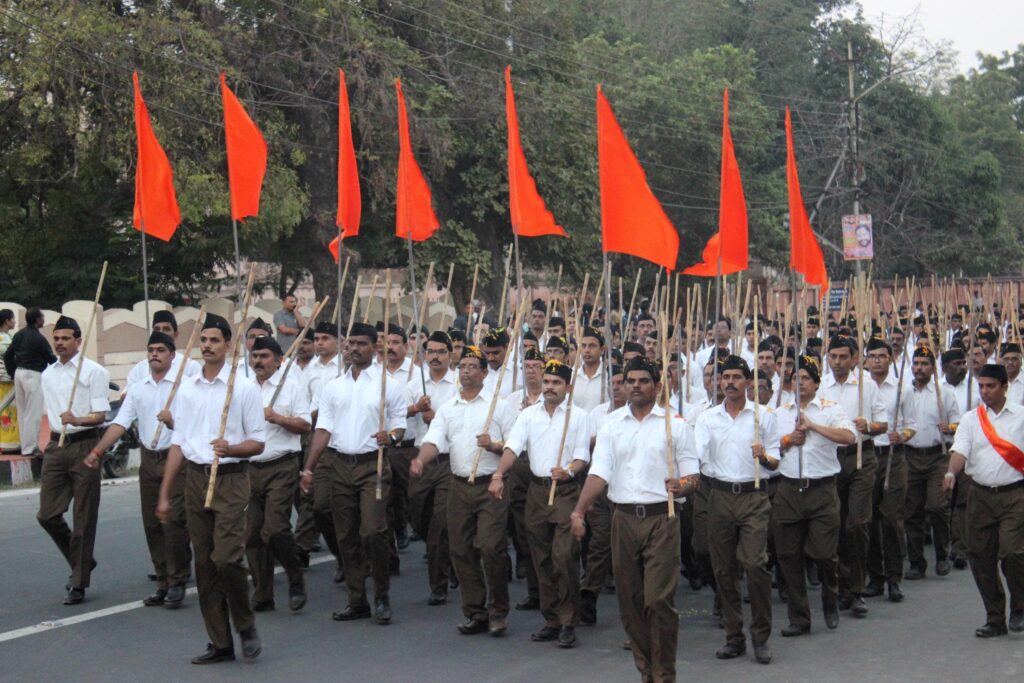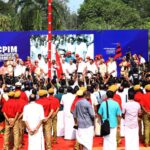‘Mission Hindutva Awakening’ could not be accomplished even during the centenary year of RSS and still appears to be an elusive task, notwithstanding Narendra Modi and other BJP leaders putting their best to communalise and polarise the Indian social structure. The failure of the saffron ecosystem to give shape to their project, turning India into a Hindu Rashtra, has unnerved the RSS leadership.
For evolving a strategy to achieve this intractable task, the RSS had organised a three-day Akhil Bharatiya Pratinidhi Sabha in Bangalore from March 21. The RSS was quite optimistic of making a major breakthrough but the slow pace has unnerved the leadership. RSS Prachar Pramukh Sunil Ambedkar confessed critical analysis of its 2024-25 annual report will discuss “issue of Hindu awakening, an analysis of the current scenario of the country, including a discussion on the follow-up activities.”
The most important task before the Sabha is to review the progress made on the work expected to be done in the run-up to the completion of 100 years of the RSS on Vijayadashami. The meeting will also prepare a framework of various programmes, events and campaigns. Over 1500 delegates participating at the meet will also try to find out the reasons why the saffron ecosystem had failed to accomplish the task in the centenary year.
Ever since Modi became prime minister, the RSS has been working on the plan to transform the basic identity and character of India. Though it has been using ‘Bharat’ for India in its documents and communiques, it has not yet succeeded in giving a preliminary form to its mission. At one stage the RSS was toying with the idea to direct Modi to adopt a resolution in the Parliament on Hindu Rashtra. But this could not happen after the BJP failed to win 400 Lok Sabha seats. RSS leadership holds that this reflects the poor electoral strategy of the BJP leadership, especially that of Modi and Amit Shah. They could have some other formula instead of the emphasis on changing the Constitution.
During the recent meeting of Mohan Bhagwat with the state RSS cadres and leaders of Bengal and UP, it surfaced that BJP leaders have been busy projecting themselves than achieving the saffron target. Hindus who had associated with the BJP in the wake of Pulwama incident, ahead of 2019 Lok Sabha elections, got disillusioned and deserted the party. This shift in the allegiance was perceptible in the 2024 Lok Sabha elections, when the BJP failed to win sufficient number of seats to form a government of its own.
The Pratinidhi Sabha would also decide the modalities for effective intervention in the national social and political situation. Insiders maintain that RSS cannot leave the task to the BJP leadership and that none of the senior BJP leaders have that kind of wider perspective. They are also not so skilled to comprehend the social changes taking place in the country.
The meeting to be held at Channenahalli will also prepare a framework of various programmes and campaigns to be taken up this year. Ambedkar said RSS chief Mohan Bhagwat and general secretary Dattatreya Hosabale will be present, which will also be attended by all the joint general-secretaries and other office bearers, including members of the national executive and presidents, general secretaries and organising secretaries of “RSS-inspired organisations”.
The primary reason for holding this crucial meeting in Karnataka is to win over the trust of the Hindus of south India. The RSS and BJP have strong bases in Karnataka but attempts to reach out to the Hindus of Kerala and Tamil Nadu failed. As usual they are blaming the Hindus of these two states of nursing the impression of RSS being anti-Islam or anti-Christian. They also hold that people in Kerala have the understanding that RSS is an organisation that creates a communal divide. RSS leaders even blame the media for spreading this feeling.
The Prathinidhi Sabha is expected to draw a blueprint detailing the strategy to expand in these two states. The Sabha (usually called Baithak) is the highest decision-making body. The question as to why the BJP has continuously failed in Tamil Nadu and Kerala has been haunting RSS leaders even if the failure made it explicit that both were developed states and people of these states were not willing into their trap. It also signified that less developed or underdeveloped were the best hunting grounds for the saffronites.
The RSS finds itself in a precarious state wherever the level of education is comparatively high and where educated youths have fair access to employment opportunities. The demographic structure of these two states does not serve the political needs of RSS. In order to woo the Hindus of the region, the RSS will popularise its concept of “Panch Parivartan”; a five-fold transformation in the society; inculcate a sense of “swa” (self) with “Bharatiya” values, imbibe family values, promote social harmony, exhort people to adopt environment-friendly lifestyle and perform civic duties.
Surprisingly some RSS leaders do not look at the massive participation of pilgrims at Maha Kumbh as the surge of Hindutva, awakening of national Hindu consciousness. They perceive it as a simple market boost and massive consumerisation of the event. This issue is also likely to feature at the meet and RSS leaders will deliberate on how to use these occasions to strengthen the Hindutva base and entice Hindus. Notably, the meeting will discuss the centenary celebrations of the RSS, which will commence on Vijayadashami (Dussehra) 2025. This period from Dussehra 2025 to 2026 will mark the Sangh’s 100th year.
The Sabha will also deliberate the plight of Bangladeshi Hindus. RSS leaders are of the view that the Bangladesh government has not taken effective steps to protect Hindus there. Islamic extremists continue to attack, loot and kill Hindus and instead of taking appropriate steps to stop these incidents, the Bangladesh government continues to remain a mute spectator. (IPA Service)




 CPI(M) Holds State Conference To Strengthen Organisational Activities
CPI(M) Holds State Conference To Strengthen Organisational Activities 